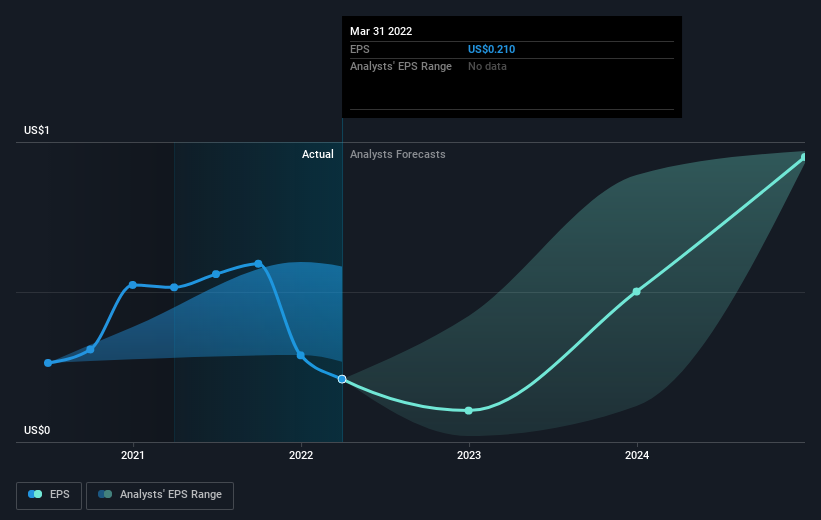Trade Desk (NASDAQ:TTD) jumps 6.9% this week, though earnings growth is still tracking behind five-year shareholder returns
It hasn't been the best quarter for The Trade Desk, Inc. (NASDAQ:TTD) shareholders, since the share price has fallen 24% in that time. But that does not change the realty that the stock's performance has been terrific, over five years. To be precise, the stock price is 888% higher than it was five years ago, a wonderful performance by any measure. So it might be that some shareholders are taking profits after good performance. But the real question is whether the business fundamentals can improve over the long term. Unfortunately not all shareholders will have held it for the long term, so spare a thought for those caught in the 35% decline over the last twelve months. Anyone who held for that rewarding ride would probably be keen to talk about it.
Since the stock has added US$1.6b to its market cap in the past week alone, let's see if underlying performance has been driving long-term returns.
View our latest analysis for Trade Desk
While the efficient markets hypothesis continues to be taught by some, it has been proven that markets are over-reactive dynamic systems, and investors are not always rational. One way to examine how market sentiment has changed over time is to look at the interaction between a company's share price and its earnings per share (EPS).
Over half a decade, Trade Desk managed to grow its earnings per share at 20% a year. This EPS growth is slower than the share price growth of 58% per year, over the same period. So it's fair to assume the market has a higher opinion of the business than it did five years ago. And that's hardly shocking given the track record of growth. This favorable sentiment is reflected in its (fairly optimistic) P/E ratio of 239.44.
The company's earnings per share (over time) is depicted in the image below (click to see the exact numbers).
It's good to see that there was some significant insider buying in the last three months. That's a positive. On the other hand, we think the revenue and earnings trends are much more meaningful measures of the business. Dive deeper into the earnings by checking this interactive graph of Trade Desk's earnings, revenue and cash flow.
A Different Perspective
We regret to report that Trade Desk shareholders are down 35% for the year. Unfortunately, that's worse than the broader market decline of 17%. Having said that, it's inevitable that some stocks will be oversold in a falling market. The key is to keep your eyes on the fundamental developments. Longer term investors wouldn't be so upset, since they would have made 58%, each year, over five years. It could be that the recent sell-off is an opportunity, so it may be worth checking the fundamental data for signs of a long term growth trend. I find it very interesting to look at share price over the long term as a proxy for business performance. But to truly gain insight, we need to consider other information, too. Case in point: We've spotted 3 warning signs for Trade Desk you should be aware of.
There are plenty of other companies that have insiders buying up shares. You probably do not want to miss this free list of growing companies that insiders are buying.
Please note, the market returns quoted in this article reflect the market weighted average returns of stocks that currently trade on US exchanges.
Have feedback on this article? Concerned about the content? Get in touch with us directly. Alternatively, email editorial-team (at) simplywallst.com.
This article by Simply Wall St is general in nature. We provide commentary based on historical data and analyst forecasts only using an unbiased methodology and our articles are not intended to be financial advice. It does not constitute a recommendation to buy or sell any stock, and does not take account of your objectives, or your financial situation. We aim to bring you long-term focused analysis driven by fundamental data. Note that our analysis may not factor in the latest price-sensitive company announcements or qualitative material. Simply Wall St has no position in any stocks mentioned.


